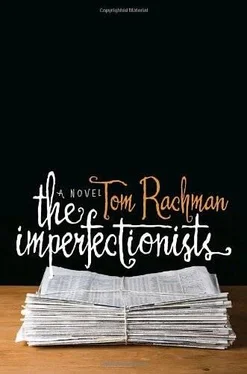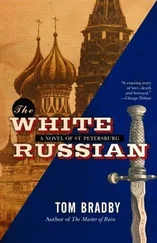The headstone is an uninspiring affair-"Cyrus Ott. Born 1899. Died 1960"-so Oliver proceeds to more diverting tombs, reading under his breath the inscribed names: "Gertrude Parsons Marcella… Lieutenant Colonel Harris Arthur McCormack… Wolfgang Rappaport. Dead at age four." He tells the dog, "Michael James Lamont Hosgood died at fifteen. That's him, beside his mother. But she died twenty years later in Kent. She must have asked to be buried back here, alongside her son. Don't you think, Schop?" The tomb of Devereux Plantagenet Cockburn is adorned with a life-size statue of the deceased, a young fop reclining with a cocker spaniel in his lap and his thumb inserted in a book, as if every visitor to the grave were a pleasant interruption from his studies. Oliver reads the lengthy inscription, which concludes: "He was beloved by all who knew him, and most precious to his parents and family, who had sought his health in many foreign climes. He departed this life in Rome, on the 3rd of May 1850, aged 21 years."
The sun resigns its position in the sky and the mosquitoes assume theirs, so Oliver and Schopenhauer head back to the Aventine Hill. Their home is a sixteenth-century mansion that Cyrus Ott bought cheap in the early 1950s. Oliver punches in the digital code and the mechanized steel gate parts squeakily. Inside, the telephone rings.
Oliver releases Schopenhauer, winds up the leash, and enters the living room. The ceiling is even higher than in the entrance hall, paneled with rococo reliefs, with starbursts and peach cherubim gamboling around the corners. The oil paintings on the walls are too poorly lit for their subjects to be immediately discernible-from a distance, all appear to depict woods at night; only the gilt frames glint. Into the Oriental rugs, deep paths have been worn from pedestrian traffic: to the kitchen, to the shuttered windows, to the bookshelves, to the tete-a-tete settee, to the old telephone whose antiquated bell at this moment rattles against the wallpaper. The answering machine kicks in.
"Hi, it's me again," Kathleen says. "I'm at the office. Please give me a call. Thanks."
Oliver plucks a paperback Agatha Christie from a stack on the floor and settles himself and the dog (lured with a chocolate cookie) on the settee. At 7 P.M., the housekeepers announce dinner. It's some sort of stew. Too much rosemary and too little salt, but perfectly edible. Schopenhauer sniffs the meat-scented air beseechingly, his droopy eyes bloodshot, spittle on his chops. Oliver fetches that day's paper-the subscription department insists on sending it, though he never reads the thing. He spreads it across the table and places his plate of leftovers on top. He pulls up a chair for Schopenhauer, who leaps up and shoots his snout across the table. The dog turns his muzzle to one side to snap up meat and carrots, then jerks his head back, flinging the food down his throat.
"A knife and fork would be preferable," Oliver says. "But there's no teaching you."
Once the plate is clean, Oliver scrunches up the paper, specked with gravy and gobbets of gristle. He disposes of the mess in the kitchen as Schopenhauer drinks from his bowl, tongue and ears slapping the water.
The phone in the living room rings again. And, again, the machine gets it. "I'm headed home now," Kathleen says wearily. "You can get me on my cell. Appreciate if you'd call tonight. Kinda urgent. Thanks."
Schopenhauer noses open the door and wanders off, padding upstairs.
"Time alone is good for any relationship," Oliver comments as if the dog were still in the room to hear it. Oliver lies on his belly on the floor, piles of books ranged around him like tall grass: Miss Marple's Final Cases, a Taschen monograph on Turner, Sotheby's twentieth-century British art-auction listing, The Penguin Complete Father Brown, a catalog from Caravaggio: The Final Years at the National Gallery, and The Case-Book of Sherlock Holmes. "Where have you gone?" he asks the absent dog. He checks in the kitchen. "Schop?" He peers into the dining room. "Where in the devil's name are you?"
He climbs the darkened staircase with a flashlight. (Oliver inhabits only the ground floor; the rest of the mansion is all darkness, covered by tarpaulins.) The beam of his torch sweeps across the second-floor landing. "Schopenhauer, where are you?" Oliver is swallowed into the black belly of the house; a chandelier twinkles; the telephone in the living room rings. The answering machine beeps, its message number flashing permanently at "99" because the display lacks a third digit.
"Where are you, you fool?" Oliver calls into the darkened ballroom. He shines the flashlight about and exclaims, "Ah!"-reflective eyes under the piano. "Sorry, I'm blinding you." He turns off the flashlight and the basset hound trots over, his overlong nails clacking on the hardwood floor. Oliver kneels to greet his friend. "What were you doing under the piano? Sleeping?" He strokes Schopenhauer's long, damp ear. "I hope I didn't wake you."
They fumble through the dark to the study, which contains documents from his grandfather's time in Rome. Oliver clicks on the lamp and, snooping like a whodunit detective, peeks into the drawers. He finds a letter pad containing Ott's notes of fifty years before-references to newsprint rolls, the price of Linotype machines, telex rates. There is an unfinished letter from Ott to his wife and son: "Dear Jeanne and Boyd, the important thing to realize, and I need to make this clear." It ends there.
Oliver turns the page and finds another of Ott's letters. "I want you to have all the paintings-we bought them together and I feel they should be yours," it begins. "Take this to my lawyers and they will do as I say." The next line is illegible. Then: "I long to see you, but I will not telephone. Nothing pleasant about this illness. Nothing anybody needs to see. But you should know that I regret certain things," the letter says. "I regret that I left you in New York. But I made that decision and I must live with it. I married, then you married. I was not going to interfere after that. I was an honorable man, I believed, and did not know how to stop being one. To think of that now, it seems outright madness. But I got myself into a tangle. I tied myself in knots. I built and I built-heaven knows I have done that well. Those skyscrapers, full of tenants, floor after floor, and not a single room containing you. You asked why I came here to Rome. I never cared about the news. I came to be in the same room as you, even if I had to build that room, fill it with people, with typewriters, the rest. I only hope you understand that the paper was for you."
A blue ink stain follows, as if the tip of the pen rested here for some time. The handwriting resumes, tiny now: "Can't send this… Damn well must… Too late now… Don't be a fool-just send her this."
He never did.
Oliver places the pad back in the drawer. "You fat beast," he tells Schopenhauer, as he carries him down the stairs. "You're so much heavier than I think-I always forget that." He puts the dog down in the living room, as if lowering a table to its feet. The table scampers away. "Asleep under the piano!" he remarks, smacking his hands together. "Now I'm all covered in dust."
The phone rattles the wallpaper. "I pretend it's not ringing," Oliver says, "and it pretends I'm not here."
The machine beeps. "Oliver, this is Abbey. I'm happy to brief you on my meetings in Atlanta. Anyway, I'm back now. So call me. Thanks."
Oliver coaxes Schopenhauer back onto the settee. "Stop staring at me," he tells the dog. "I'm trying to read."
Schopenhauer burps.
"You disgusting contrarian," Oliver says. But he is unable to resist for long and strokes the dog's ears. Schopenhauer rumbles contentedly, leaning into Oliver's hip. "My dear friend," Oliver says. "I'm so lucky." He adds, suddenly self-conscious, "If anyone heard me talking to you! But it's not like I'm talking to myself. You're listening because-" He stops there, to see if it prompts a response.
Читать дальше












